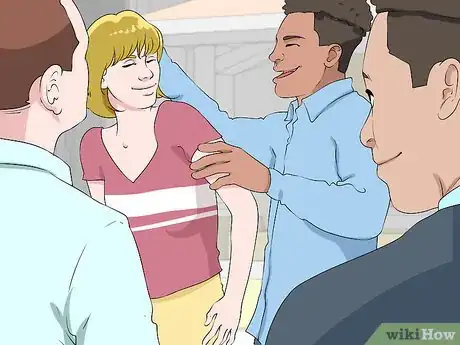This article was co-authored by Klare Heston, LCSW. Klare Heston is a Licensed Independent Clinical Social Worker based in Cleveland, Ohio. With experience in academic counseling and clinical supervision, Klare received her Master of Social Work from the Virginia Commonwealth University in 1983. She also holds a 2-Year Post-Graduate Certificate from the Gestalt Institute of Cleveland, as well as certification in Family Therapy, Supervision, Mediation, and Trauma Recovery and Treatment (EMDR).
There are 10 references cited in this article, which can be found at the bottom of the page.
This article has been viewed 192,150 times.
Whether you’ve moved to a new town or just want to improve your social life, fitting in with a new group of friends can be tricky. Tight-knit groups share memories, inside jokes, and special bonds. But don’t worry. You won’t be gazing across the cafeteria and longing to fit in forever. With a little patience, planning, and a good attitude, you’ll join a great group of friends!
Steps
Introducing Yourself to the Group
-
1Join clubs, teams, and activities to get to know your future friends. Learn what members of the group do in their free time and sign up for those activities if they interest you! Soon you’ll have shared experiences, which provide a natural basis for friendship.[1]
-
2Spend one-on-one time with individuals in the group. If you try and force your way into large group hangouts right away, it’ll be overwhelming. Develop strong friendships with individuals first and use these friendships as bridges to the rest of the group.[2]Advertisement
-
3Suggest activities to individual friends and ask them to invite the rest of the group. You don't need to wait for invitations. You can create your own opportunities by coming up with social outings.
- The activity you plan doesn’t have to be elaborate. It can be a simple trip to the mall, a movie, or basketball game. If your family has a pool or lives near a fun destination, invite people to your house.
- Make sure you’re comfortable doing whatever activity you propose, so you’ll be at ease.
-
4Tell your individual friends that you want to hang out with the group. If you feel quite comfortable with a friend, just be honest and express a desire to get to know the others.
- Having a casual tone is important, so you don’t sound too eager. Just say something like, “Your friends seem really cool. It’d be great to get to know them better.”
-
5Build confidence before hanging out with the group for the first time. When you have self-confidence, you radiate positive energy that attracts others. To work on confidence, sit down with a piece of paper and write down your positive qualities.[3]
-
6
Developing Genuine Connections
-
1Say yes to invitations to hang out. Try saying yes to almost any invitation that comes your way to practice building relationships with new people. Doing this can make it seem like you're open to friendship and can help the new group of friends take you in as one of their own. Spending time with the new group can let them know you're interested in being a part of their activities as well.[6]
- Making friends takes practice, just like playing the piano, scoring a touchdown, or anything else. You wouldn’t show up at a recital without practicing first! Similarly, you can start practicing for your social life now.
-
2Give meaningful and unique compliments. Giving compliments can help break the ice. While superficial compliments never hurt, the more specific you can get, the better. Detailed compliments inspire conversation and help build connections.
- Instead of saying, “I like your hair,” offer more detail: “You did an awesome job curling your hair. What kind of curling iron did you use?”
- Rather than saying, “I liked what you said in class,” go deeper: “I had no idea Frankenstein was a novel. When did you read it?”
-
3Learn more about group members by asking about their interests. Asking questions shows others that you care about them, and many people love talking about themselves! Ask about movies, sports, favorite stores, or dream vacations.
- Use follow-up questions to keep conversation flowing. You can start by asking, “Have you seen the new Iron Man?” And follow up with: “have you read the comics?”
- After asking questions, make sure to listen closely and don’t interrupt.[7]
-
4Tell stories to share information about yourself. Avoid listing off facts about yourself. Instead, share a funny or suspenseful story from your past that will engage the group and stick in their memories![8]
- If you want them to know that you used to live in Florida and that things were different there, tell them a funny story about a crocodile you once saw on your friend’s driveway!
- But be careful not to come across as a show-off. Avoid bragging or trying to hog the spotlight.
- Remember to trade off on talking so that everyone gets a chance to participate in the conversation.
-
5Be patient while waiting for acceptance from the group. Don’t act desperate, as that can repulse others. It takes time to become fully included in any tight-kit group of friends, so relax and let things evolve at their own pace.[9]
Staying True to Yourself
-
1Avoid dramatically changing yourself just to fit in. When you start hanging out with new people, it’s normal to change a little bit. But don’t try to change everything about yourself just so they will like you. If you try and mimic them, then you’re not offering anything unique to the group. Also, you could feel lost.[10]
-
2Share your unique skills and qualities with the group. In any friend group, different individuals contribute different things. Some friends crack hilarious jokes, others offer fashion advice or dream up amazing weekend adventures.
- If you have a skill, like skateboarding, offer to teach your friends or invite them to go with you.
- If you’re a good listener, find ways to lend a sympathetic ear when friends get upset.
-
3Remain open to new experiences and new friendships. Once you’re included in a tight-knit group, it can be tempting to hang out exclusively with your new friends. But don’t overlook opportunities to form new friendships. Remember how it felt to be on the outside and look for ways to include others![11]
Expert Q&A
Did you know you can get expert answers for this article?
Unlock expert answers by supporting wikiHow
-
QuestionIf you think you are not cool enough to hang out with your friends, what should you do?
 Klare Heston, LCSWKlare Heston is a Licensed Independent Clinical Social Worker based in Cleveland, Ohio. With experience in academic counseling and clinical supervision, Klare received her Master of Social Work from the Virginia Commonwealth University in 1983. She also holds a 2-Year Post-Graduate Certificate from the Gestalt Institute of Cleveland, as well as certification in Family Therapy, Supervision, Mediation, and Trauma Recovery and Treatment (EMDR).
Klare Heston, LCSWKlare Heston is a Licensed Independent Clinical Social Worker based in Cleveland, Ohio. With experience in academic counseling and clinical supervision, Klare received her Master of Social Work from the Virginia Commonwealth University in 1983. She also holds a 2-Year Post-Graduate Certificate from the Gestalt Institute of Cleveland, as well as certification in Family Therapy, Supervision, Mediation, and Trauma Recovery and Treatment (EMDR).
Licensed Social Worker
-
QuestionWhat if you feel out of place or you're an awkward person?
 Klare Heston, LCSWKlare Heston is a Licensed Independent Clinical Social Worker based in Cleveland, Ohio. With experience in academic counseling and clinical supervision, Klare received her Master of Social Work from the Virginia Commonwealth University in 1983. She also holds a 2-Year Post-Graduate Certificate from the Gestalt Institute of Cleveland, as well as certification in Family Therapy, Supervision, Mediation, and Trauma Recovery and Treatment (EMDR).
Klare Heston, LCSWKlare Heston is a Licensed Independent Clinical Social Worker based in Cleveland, Ohio. With experience in academic counseling and clinical supervision, Klare received her Master of Social Work from the Virginia Commonwealth University in 1983. She also holds a 2-Year Post-Graduate Certificate from the Gestalt Institute of Cleveland, as well as certification in Family Therapy, Supervision, Mediation, and Trauma Recovery and Treatment (EMDR).
Licensed Social Worker
Warnings
- Beware of peer pressure. Never do something that feels wrong just to fit in with a group.⧼thumbs_response⧽
- Don’t waste time worrying about popularity. Popularity changes based on the setting. A person who is popular in high school might not be cool in college and vice versa. It can be pretty arbitrary, and it isn’t a good way to invest your time.⧼thumbs_response⧽
- Don’t try and change yourself to fit in with a group. Good friends don’t ask that of one another.⧼thumbs_response⧽
- Be sure that you don't feel awkward around them, and they don't feel awkward around you.⧼thumbs_response⧽
References
- ↑ https://www.succeedsocially.com/sociallife
- ↑ https://au.reachout.com/articles/how-to-make-new-friends
- ↑ https://www.psychologytoday.com/blog/hide-and-seek/201205/building-confidence-and-self-esteem
- ↑ https://www.sciencedaily.com/releases/2009/10/091005111627.htm
- ↑ https://www.psychologytoday.com/blog/communication-success/201401/7-keys-establishing-confident-impression
- ↑ https://lifehacker.com/how-i-broke-out-of-my-social-comfort-zone-by-saying-yes-1707305772
- ↑ https://www.psychologytoday.com/blog/talking-apes/201706/the-best-way-make-new-friends
- ↑ http://www.selfstairway.com/how-to-approach-people/
- ↑ https://au.reachout.com/articles/how-to-make-new-friends
About This Article
It can feel overwhelming to try and fit into a new group of friends, so start by getting to know individual members of the group. First, spend one-on-one time with them to develop good friendships, as this can create a bridge to the rest of the group. It can also help if you tell your individual friends that you want to hang out with the group. For example, you could say “Your friends seem really cool. It’d be great to get to know them better.” Once you’re part of the group, work on building genuine connections. If you get invited to hang out, say yes whenever possible to show that you’re open to friendship. Try to learn more about the members of the group by asking questions about their interests. For example, you could ask about their favorite movies, sports, or stores. For more advice on fitting into a new group of friends, like how to stay true to yourself, read on!











































































